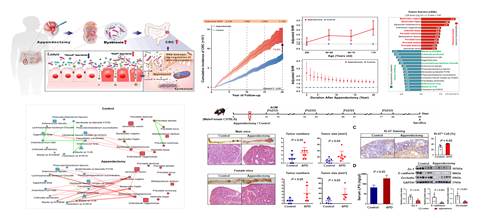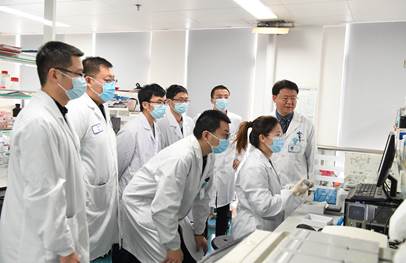The research results of the teams led by Professor She Junjun and Professor Yu Jun from the First Affiliated Hospital of Xi 'an Jiaotong University (XJTU) were recently published as an article entitled “Altered gut microbiome composition by appendectomy contributes to colorectal cancer” in Oncogene. This study suggests that there is a correlation among appendectomy, gut microbial dysbiosis and colorectal cancer (CRC), and appendectomy can cause gut microbial dysbiosis, thereby leading to a significant increase in the risk of CRC. These critical findings provide novel ideas and theoretical evidence for improving the prevention and treatment strategy of CRC.
Recent studies have shown that theappendix is abundant in lymphoid tissues, which plays an important role in gut immune regulation and microbial composition. The long-term prognosis after appendectomy is intimately associated with multiple diseases, including CRC. "Expert Consensus on Early Diagnosis and Screening for Colorectal Cancer in China (2018)" lists appendectomy as one of the high-risk factors for CRC screening. However, whether appendectomy exactly increases the risk of CRC and its underlying mechanism remains to be clarified.

The teams led by Professor She Junjun and Professor Yu Jun have been devoted to 5-year analysis of a large-scale cohort of 400,000 patients from Xi 'an and Hong Kong with a longest follow-up of 20 years. They found that the risk of CRC in the appendectomy group is increased by 73% compared with that in the control group. Furthermore, shotgun metagenomic sequencing was performed on 314 fecal samples from 157 appendectomy cases and 157 non-appendectomy controls indicated that gut microbial dysbiosis in appendectomy subjects was observed with significant enrichment of 7 CRC-promoting bacteria (Bacteroides vulgatus, Bacteroides fragilis, Veillonella dispar, Prevotella ruminicola, Prevotella fucsa, Prevotella dentalis, Prevotella denticola) and depletion of 5 beneficial commensals (Blautia sp YL58, Enterococcus hirae, Lachnospiraceae bacterium Choco86, Collinsella aerofaciens, Blautia sp SC05B48). The interactions among gut microbes tended to promote inflammation and tumorigenesis. After gut barrier dysfunction induced by appendectomy, AOM/DSS could accelerate the incidence and development of CRC under the impact of gut microbes post-appendectomy, but there was no significant difference after eliminating gut microbes with broad-spectrum antibiotics.

Physician Shi Feiyu and Doctoral student Liu Gaixia from Department of General Surgery of the First Affiliated Hospital of XJTU are the first co-authors. Professor She Junjun and Professor Yu Jun are the co-corresponding authors. Department of General Surgery of our hospital is the first and corresponding affiliation of this article. Institute of Gut Microecology of Med-X Research Institute in Western China Science and Technology Innovation Harbour and Talent Highland Experimental Platform provide experimental support.